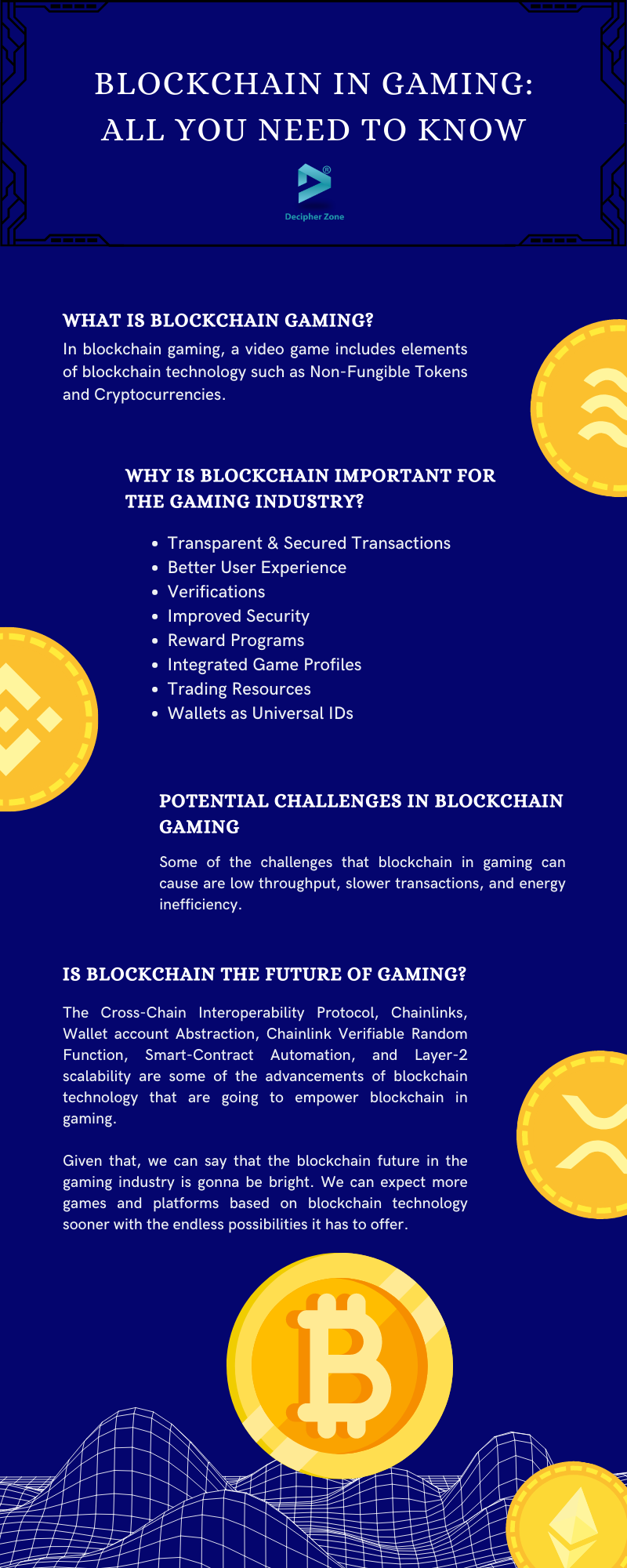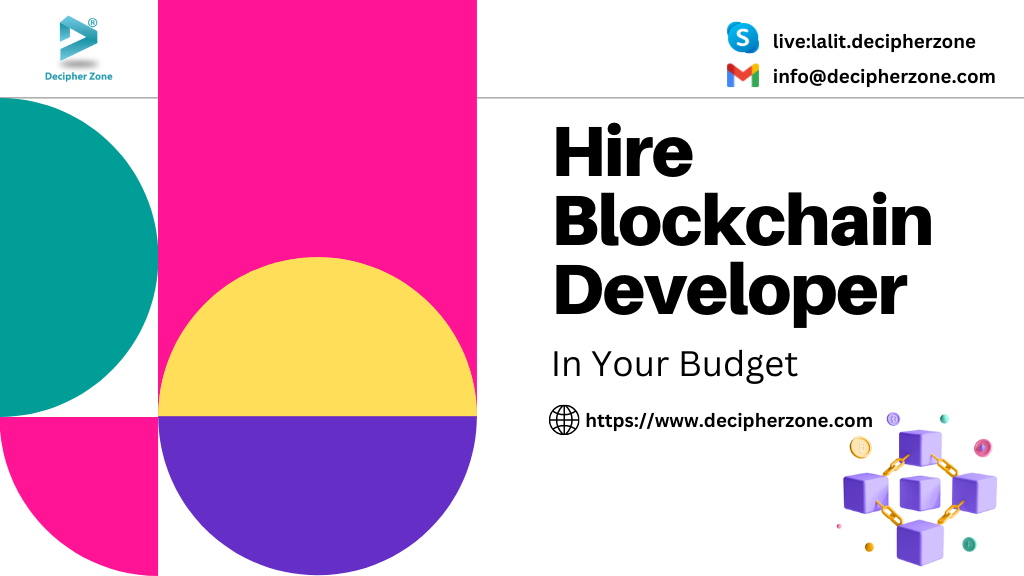Over the past decade, blockchain has become one of the most important technologies. And now everyone seems to be talking about it - regardless of whether they understand blockchain and its working.
For those who have little understanding of blockchain, we have an article on “What is Blockchain and How it Works” that you can check out before moving ahead.
According to Markets and Markets shared stats, the global market of blockchain gaming is expected to grow at a CAGR of 70.3% and reach a whopping $65.7 Billion by 2027. Undoubtedly, the gaming industry is in for major changes through adopting blockchain technology.
But wait, what is blockchain gaming, how it’s going to change the gaming industry, and what can be the potential challenges?
Table of Contents
-
Blockchain in Gaming: What, Why, and How
-
What is Blockchain Gaming?
-
Why is Blockchain Important for the Gaming Industry?
-
How problems can be solved using blockchain technology?
-
Potential Challenges
-
Is Blockchain The Future of Gaming?
-
How can Decipher Zone Help?
-
FAQs
In this blog, we intend to cover everything that you should know about blockchain gaming. So, it's time to get started!
What is Blockchain Gaming?
Before learning about blockchain gaming, let us understand the basics of blockchain. A blockchain, by definition, is an immutable, decentralized, and shared ledger that facilitates asset tracking and transaction recording in a network.
Blockchain has opened new opportunities for the virtual economy first through cryptocurrencies, and now with decentralized gaming.
Read: Blockchain Technology
In blockchain gaming, a video game includes elements of blockchain technology such as Non-Fungible Tokens and Cryptocurrencies. Players can trade in-game items via cryptocurrencies and NFTs (digital assets whose ownership proof is stored in a blockchain network) while the game publishers take a fee for each transaction for monetization.
Play-to-earn games are a subset of blockchain games as they allow players to earn crypto from playing.
Note: Cryptocurrencies are digital currencies or alternative payments created using cryptography (an encryption method) for secure transactions, such as Ethereum or Bitcoin.
Why is Blockchain Important for the Gaming Industry?
If you are thinking about how blockchain can help the gaming industry. Let’s first understand a few characteristics and dynamics of gaming platforms and see how blockchain fits into each scenario.
Read: Use Cases for Blockchain
-
Game developers and publishers need safe environments to build and launch games and monetize them.
-
Players need secured environments to make in-game purchases.
-
Players might want interoperable profiles to play across different platforms.
-
Players want to securely store virtual assets and the centralized server of the gaming company can’t help with that and makes their assets an easier target for hackers.
-
One of the biggest challenges in purchasing assets in the online gaming industry is you never really own them but rather the gaming company owns them, opening opportunities for disruption.

How problems can be solved using blockchain technology?
Transparent & Secured Transactions:
Blockchain is an immutable, secured, and transparent ledger that makes fraudulent transactions or double spending impossible. In the gaming industry, it can help in adding an extra layer of security for players to commit digital transactions while making it easier to share virtual assets/sensitive information.
Better User Experience:
Using blockchain technology in gaming provides more control to the players. It allows the users to create their storylines/characters or download any game from any location without compromising their gaming experience.
Verifications:
Blockchain can help prevent fraud in the interactions and transactions of the gaming platform by verifying the parties involved through proof of work.
Improved Security:
As blockchain adds Two-Factor Authentication and Secure Messaging encryptions, the information of the game, players, and user transactions become highly protected.
Reward Programs:
In centralized gaming players can only win reward points that have no real-life value outside the game. However, implementing blockchain can assist in designing better reward programs where players can earn cryptocurrencies and use them to make purchases not only in the gaming platform but also outside it.
Integrated Game Profiles:
Using blockchain technology, developers can create a centralized community, allowing players to access different games from one profile across multiple platforms.
Trading Resources:
As blockchain creates an immutable record of each transaction, item, and ownership, players can trade their virtual assets for other resources or profits with complete transparency.
Wallets as Universal IDs:
The crypto wallets of the players will become a universal gaming ID, allowing players to create one wallet to access all blockchain-based games.
Potential Challenges in Blockchain Gaming
While blockchain brings incredible benefits to the gaming industry and players, there are some limitations that we need to remember as well.
Read: Consensus Algorithms in Blockchain
-
Several pre-existing blockchains are not yet prepared to handle the vast transactional volume that gaming economies will create. It will make the transactions slow, leading to long waiting times for completing transactions.
-
Some blockchains are built on a “proof of work” system that requires energy-guzzling machines to solve complex problems and verify transactions. Thus, it is more likely to cause environmental impact and high gas fees.
Is Blockchain The Future of Gaming?
Although there are some challenges when it comes to blockchain gaming, we are bound to see some improvements in the future. The Cross-Chain Interoperability Protocol, Chainlinks, Wallet account Abstraction, Chainlink Verifiable Random Function, Smart-Contract Automation, and Layer-2 scalability are some of the advancements of blockchain technology that are going to empower blockchain in gaming.
Despite all the challenges, some of the popular blockchain games you will find in the market include Alien Worlds, Farmers World, Planet IX, Nine Chronicles, and Tiny World.
Read: Blockchain Testing
Given that, we can say that the blockchain future in the gaming industry is gonna be bright. We can expect more games and platforms based on blockchain technology sooner with the endless possibilities it has to offer.
Blockchain Game Development Cost
Developing a blockchain game can cost somewhere between $40,000 and $200,000. A few factors affecting the development cost of blockchain games are the size of the game (mini, mid, or high-level), 2D/3D graphics, complexity, features, and most importantly the region of the development team you will be outsourcing.
How can Decipher Zone Help?
Blockchain technology is indeed becoming more sensational and critical to not only gaming but also the financial industry. At Decipher Zone, we have a team of experienced blockchain developers who can help you build blockchain-based games for your business and take the profits to new heights.
All you need to do is get in touch with our experts today!

FAQs about Blockchain in Gaming
Is blockchain gaming profitable?
As blockchain allows real-world trading of NFTs in the gaming industry, it inevitably is going to be highly profitable for both players and businesses.
What are the disadvantages of blockchain for gaming?
Some of the disadvantages that blockchain in gaming can cause are low throughput, slower transactions, and energy inefficiency.
How do blockchain gaming companies make money?
A blockchain gaming company can make money either by selling in-platform items or through advertisements.

